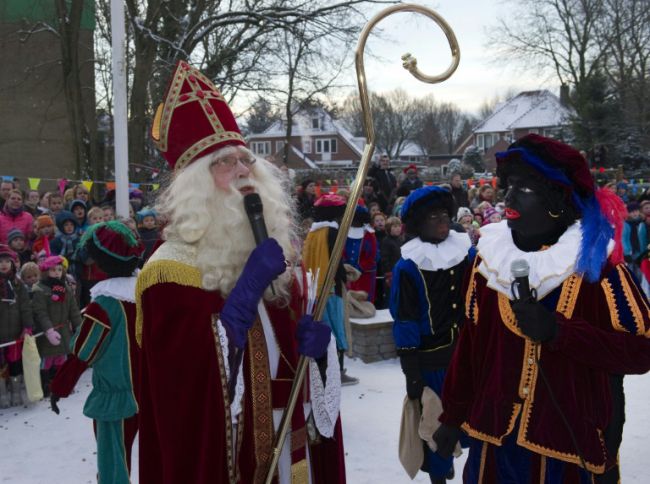
The Christmas season sees the arrival of Saint Nicholas and his sidekick Zwarte Piet, or Black Pete, who traditionally wears blackface, red lips and an afro wig — and is regularly denounced for racist stereotyping
AMSTERDAM – As winter draws in each year, the Netherlands revels in the festive arrival of Saint Nicholas — but for many it is anything but a cause for celebration.
The season also heralds the appearance of his sidekick Zwarte Piet, or Black Pete, who traditionally wears blackface, red lips and an afro wig — and is regularly denounced for racist stereotyping.
However, after a decade of fighting for the abolition of the character, one leading campaigner says that in the year of Black Lives Matter the struggle has taken a “giant step”, even if there is further to go.
“It’s been a hard battle and we have still got a hard battle ahead of us,” Jerry Afriyie, a poet and co-founder of the Kick Out Zwarte Piet (KOZP) movement, told AFP in an interview.
“It’s more than Zwarte Piet, it’s about power — who gets to decide who’s Dutch or not, who gets to decide whether we’re going to uphold a racist tradition or not, and who gets to decide what’s racism or not.”
Black Pete has become the annual battleground of the culture wars in the Netherlands.
Defenders say the character is popular with children, handing out sweets during festive parades through Dutch cities, with his face simply black from coming down the chimney to leave presents.
But this ignores the fact that many Dutch black or ethnic minority children routinely suffer racist abuse in the run up to the December 5 Sinterklaas festival, says Afriyie.
A UN committee said in 2015 said the character was seen as “a vestige of slavery” by many.
– ‘Very dehumanising’ –
“Since I was a young child… I came to the realisation about this tradition, our winter holiday, is influenced by racism,” says Afriyie, 39, who came to the Netherlands from Ghana aged 11.
“Having children laughing at you at school, that your skin colour is dirty, or that people call you Zwarte Piet… It makes them feel less of a human being, it’s very dehumanising,” says Afriyie.
Since he joined forces with other activists to found the group in 2011, KOZP has been holding regular protests against Black Pete.
Anti-Black Pete demonstrations have been targeted by pro-Pete groups, with eggs and sometimes punches thrown at them, most recently in the town of Venlo on Saturday.
Afriyie himself has received threats.
The group has also been on the receiving end of rough treatment by the police, with a video showing officers hitting Afriyie with fists and batons at a protest in 2016.
“I’ve been beaten up multiple times by the police, in 2014. I… could have lost my life because of being put in a chokehold, couldn’t breathe,” says Afriyie.
The tide has slowly changed in the Netherlands, with broadcasters and local authorities bringing in “Sooty Petes” with streaks of black instead of full blackface.
– ‘Giant step forward’ –
This year has however seen several breakthroughs.
The Black Pete tradition was targeted internationally as part of the BLM protests that swept the globe after the killing of black American man George Floyd by police in the United States.
Facebook said it was banning blackface depictions including Black Pete, while US civil rights leader Jesse Jackson urged the Netherlands to ban the tradition.
Meanwhile Dutch Prime Minister Mark Rutte — who for years argued that “Black Pete is just black” — said in June that he now expected the tradition to die out.
“What has happened this year is that it all came together” after years of efforts by Kick Out Zwarte Piet, says Afriyie.
The BLM protests in the US “made people, especially young people, look at their own situation” in the Netherlands and realise they have been “hearing this same story for the past 9-10 years”.
“It made sure that we kind of took off and helped for us to make a giant step forward, definitely,” he added.
The coronavirus pandemic has also helped the campaign, as people have more time at home to read up on the fight against Black Pete, and many parades have been cancelled because of the outbreak, he says.
Afriyie is now pushing for further changes through the Nederland Wordt Beter (Netherlands Will Get Better) foundation.
As well as seeking to ban Black Pete, it wants the Netherlands to introduce educational programmes about its colonial past and a “national remembrance and celebration of the abolishment of slavery”.
The biggest sign of hope this past year has been the involvement of young people, adds Afriyie.
“What we have gained most is that the youth is standing up. These young people under 25, they don’t play — don’t mess with them, don’t come with your racist shit to them,” he says.
